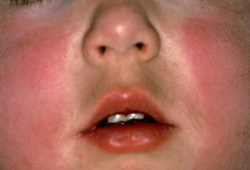Summary
Definition
History and exam
Key diagnostic factors
- close contact with other infected individuals
- bright red macular erythema of the bilateral cheeks with sparing of the nasal ridge and perioral areas
- erythematous macules and papules evolving into lacy reticular erythema, most notable on the extremities
- immunodeficiency
Other diagnostic factors
- arthralgia/arthritis
- prodrome (fever, headache, pharyngitis, coryza, abdominal pain)
- symptoms of anemia
Risk factors
- close contact with other infected individuals
- immunodeficiency
- age 6 to 10 years
Diagnostic tests
1st tests to order
- clinical diagnosis
Tests to consider
- CBC
- reticulocyte count
- serology
- DNA assays
Treatment algorithm
fever
secondary arthritis
persistent (>3 weeks) parvovirus B19 infection
Contributors
Authors
Joseph M. Lam, MD
Clinical Associate Professor, Department of Pediatrics
Associate Member, Department of Dermatology and Skin Sciences
University of British Columbia, BC Children’s Hospital
Vancouver
BC
Canada
Disclosures
JML declares that he has no relevant competing interests.
Alexander K. C. Leung, MD
Department of Pediatrics
The University of Calgary, Alberta Children's Hospital
Calgary
Alberta
Canada
Disclosures
AKCL declares that he has no relevant competing interests.
Acknowledgements
Dr Joseph M. Lam and Dr Alexander Leung would like to gratefully acknowledge Dr Kari L. Martin, Dr Christine T. Lauren, Dr Jon Dyer, and Dr Jennifer Holman, the previous contributors to this topic. KLM has served as a board member for Women's Dermatologic Society and American Contact Dermatitis Society. CTL, JD, and JH declare that they have no competing interests.
Peer reviewers
Nevio Cimolai, MD
Professor
Department of Pathology and Laboratory Medicine
Children's and Women's Health Centre of British Columbia
Vancouver
Canada
Disclosures
NC declares that he has no competing interests.
Peer reviewer acknowledgements
BMJ Best Practice topics are updated on a rolling basis in line with developments in evidence and guidance. The peer reviewers listed here have reviewed the content at least once during the history of the topic.
Disclosures
Peer reviewer affiliations and disclosures pertain to the time of the review.
References
Key articles
Young NS, Brown KE. Parvovirus B19. N Engl J Med. 2004;350:586-597. Abstract
UK Health Security Agency. Parvovirus B19: guidance, data and analysis. Aug 2024 [internet publication].Full text
Cherry JD. Parvovirus infections in children and adults. Adv Pediatr. 1999;46:245-69. Abstract
Kimberlin DW, Banerjee R, Barnett ED, et al. Red book: 2024-2027 report of the Committee on Infectious Diseases. 33rd ed. Elk Grove Village, IL: American Academy of Pediatrics; 2024.
Centers for Disease Control and prevention. Parvovirus B19 and fifth disease. Nov 2019 [internet publication].Full text
Reference articles
A full list of sources referenced in this topic is available to users with access to all of BMJ Best Practice.

Differentials
- Rubella
- Measles infection
- Roseola infantum
More DifferentialsGuidelines
- Parvovirus B19 and fifth disease
- Cytomegalovirus, parvovirus B19, varicella zoster, and toxoplasmosis in pregnancy
More GuidelinesLog in or subscribe to access all of BMJ Best Practice
Use of this content is subject to our disclaimer